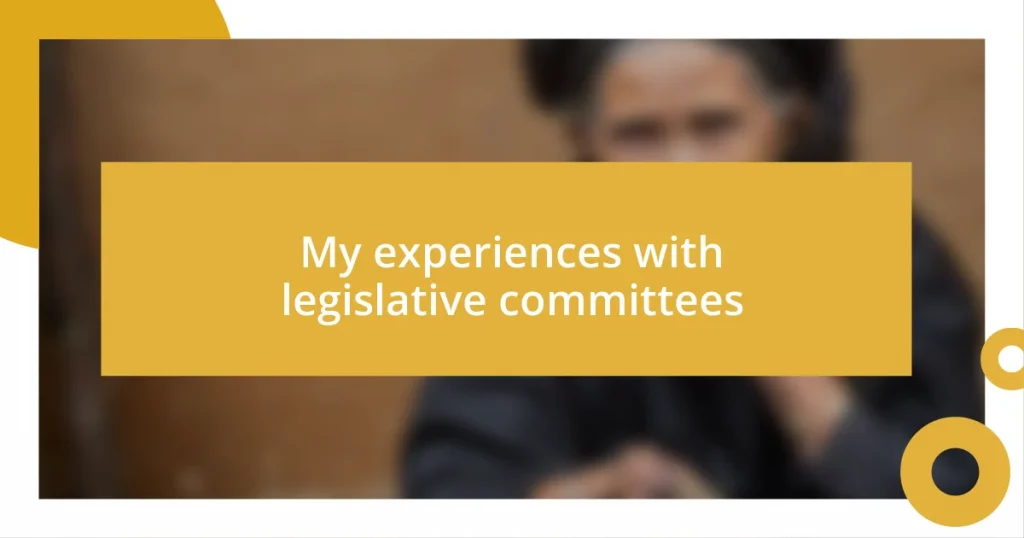Key takeaways:
- Legislative committees are essential for detailed bill examination, filtering legislation, and fostering community engagement, which influences the lawmaking process.
- Personal experiences and emotional storytelling during discussions highlight the human element of policy-making, emphasizing the importance of empathy and collaboration.
- Effective participation requires thorough preparation, relationship-building, and clear communication, aiding in navigating the complexities of legislative committees.
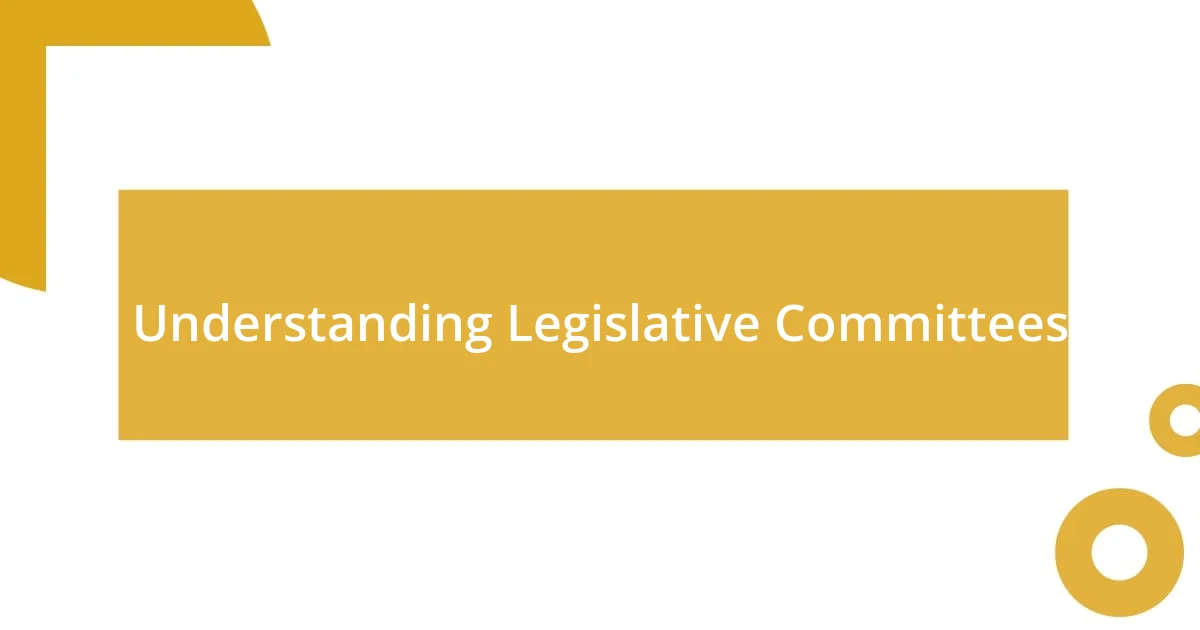
Understanding Legislative Committees
Legislative committees play a crucial role in shaping laws and policies. In my experience, sitting in on committee meetings has revealed the behind-the-scenes vetting process that bills undergo before they ever reach the floor for a vote. I remember feeling both excitement and apprehension as I listened to passionate debates; the outcomes here often set the stage for the laws that govern our lives.
Each committee specializes in different areas, from health to finance, allowing for detailed examination of complex issues. I distinctly recall a committee focused on environmental policies, where members grappled with balancing economic growth against sustainability. It made me wonder—how do lawmakers decide which side to prioritize, and what influences their decisions? It’s these moments of introspection that highlight the committee’s responsibility to represent diverse perspectives.
As I’ve observed, the dynamics within a committee can be incredibly revealing. In one meeting, a seasoned legislator openly expressed concern about a proposed bill’s impact on the community. That vulnerability struck a chord with me; it showcased that behind the political jargon are real people grappling with the implications of their choices. I often think about how these discussions can transform an abstract idea into something tangible that affects the lives of many.
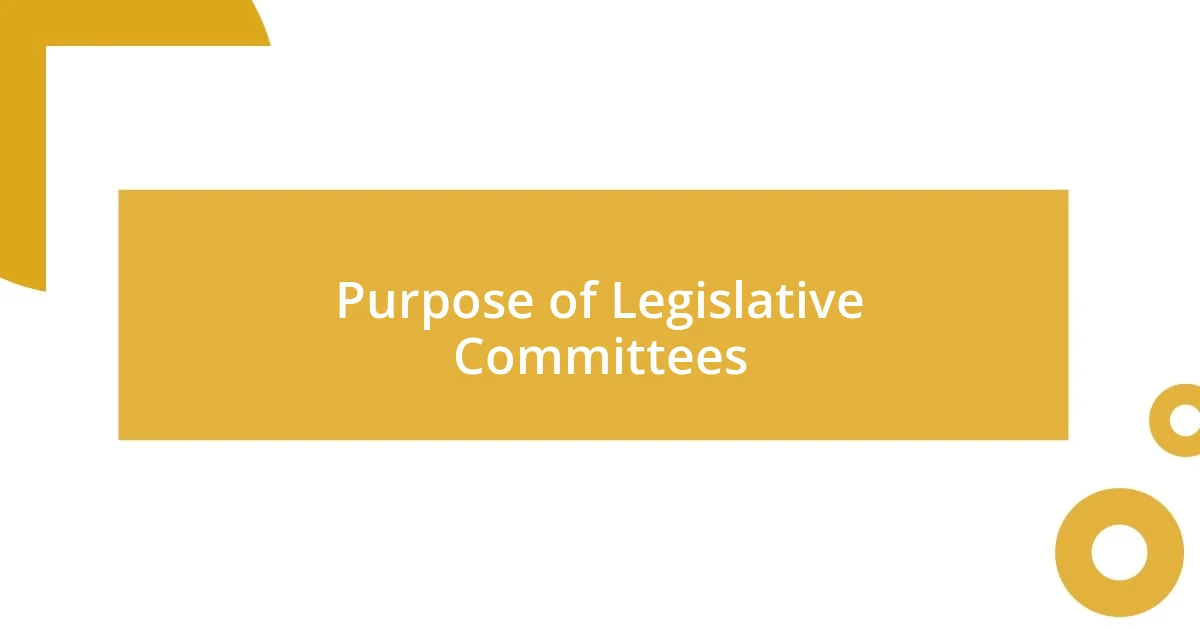
Purpose of Legislative Committees
Legislative committees serve a vital purpose in the lawmaking process by facilitating in-depth discussions and analysis of proposed bills. I remember attending a session where a committee debated a healthcare reform bill. The various viewpoints expressed helped me appreciate the complexities of policy-making and the importance of expert testimonies. It was enlightening to see how testimonies from healthcare professionals could genuinely sway opinions and lead to amendments that shaped the final legislation.
Another essential role of these committees is to filter legislation, ensuring only the most relevant and necessary bills advance. I once witnessed a committee reject a bill aimed at regulating a relatively obscure industry. While some members were passionate about the issue, the majority prioritized pressing needs like education and public safety. This experience underscored the weighty responsibility committees have—deciding what gets to the legislative floor can define their legacy.
Finally, committees also act as a bridge between the public and the legislature, encouraging community involvement and transparency. During a town hall meeting organized by a committee, I felt the palpable energy as citizens shared their concerns about local infrastructure. It struck me how crucial these interactions are, as they empower constituents and remind lawmakers to stay connected to the people they serve. This direct engagement reinforces the idea that legislation isn’t just about numbers and rules; it’s about real lives and communities.
| Purpose | Description |
|---|---|
| In-Depth Analysis | Committees examine bills thoroughly, allowing for informed decision-making. |
| Filtering Legislation | They prioritize proposed bills, ensuring only essential legislation progresses. |
| Community Engagement | Committees foster communication with the public to ensure their voices are heard. |
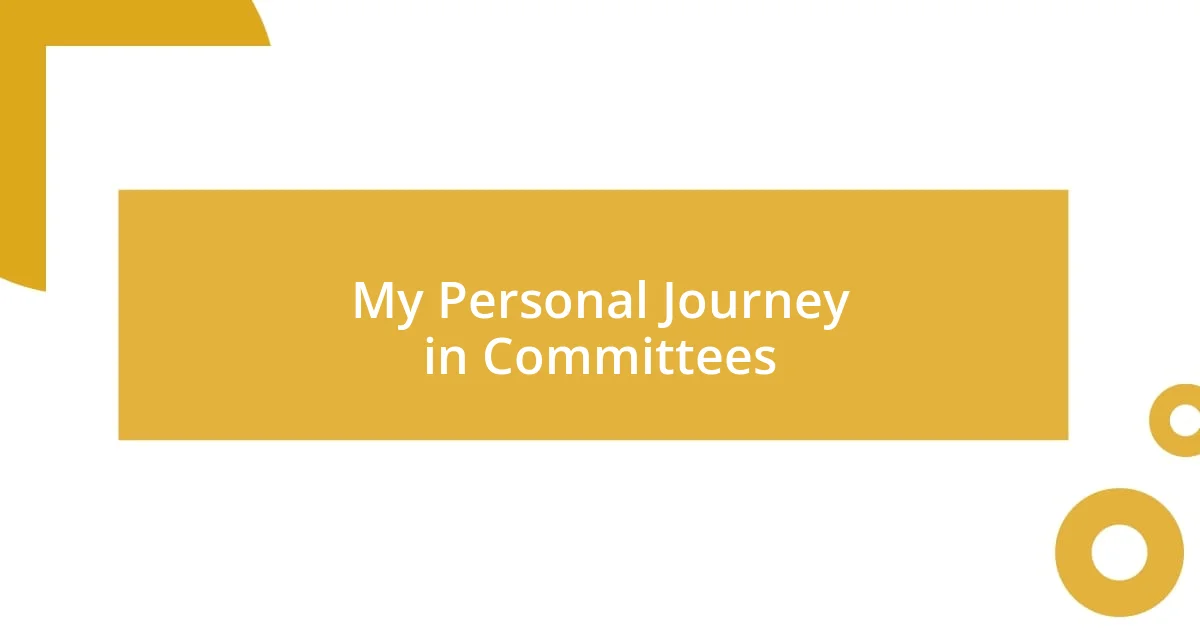
My Personal Journey in Committees
My journey in committees has been an eye-opening experience, brimming with lessons about collaboration and advocacy. One memorable instance was my first time speaking up during a session about education reform. I felt that familiar rush of excitement mixed with nervousness—but I was determined to share my perspective. I vividly remember how my voice wavered as I addressed the panel, yet the nods from fellow committee members reassured me that my words mattered. That moment reinforced the belief that everyone has something valuable to contribute, shaping the conversation in meaningful ways.
- Attending committee meetings helped me build confidence to voice my opinions.
- Observing disagreements among members highlighted how diverse viewpoints can lead to better solutions.
- Engaging with passionate advocates taught me the power of storytelling in influencing legislative outcomes.
Another pivotal experience occurred during a discussion on healthcare access. I listened as a mother, visibly emotional, recounted her struggles to find adequate medical support for her child. Her story struck a chord with me, revealing the human element often lost in policy discussions. I remember glancing around the room and noticing the change in atmosphere; suddenly, it wasn’t just about statistics and policies—it was about real lives. This encounter truly emphasized the importance of empathy in the legislative process.
- Personal stories often bring an emotional depth that policy papers lack.
- Hearing real-life struggles made abstract legislation feel more urgent and relevant.
- I’ve learned that connecting emotionally with the issues can inspire more informed and compassionate decisions.
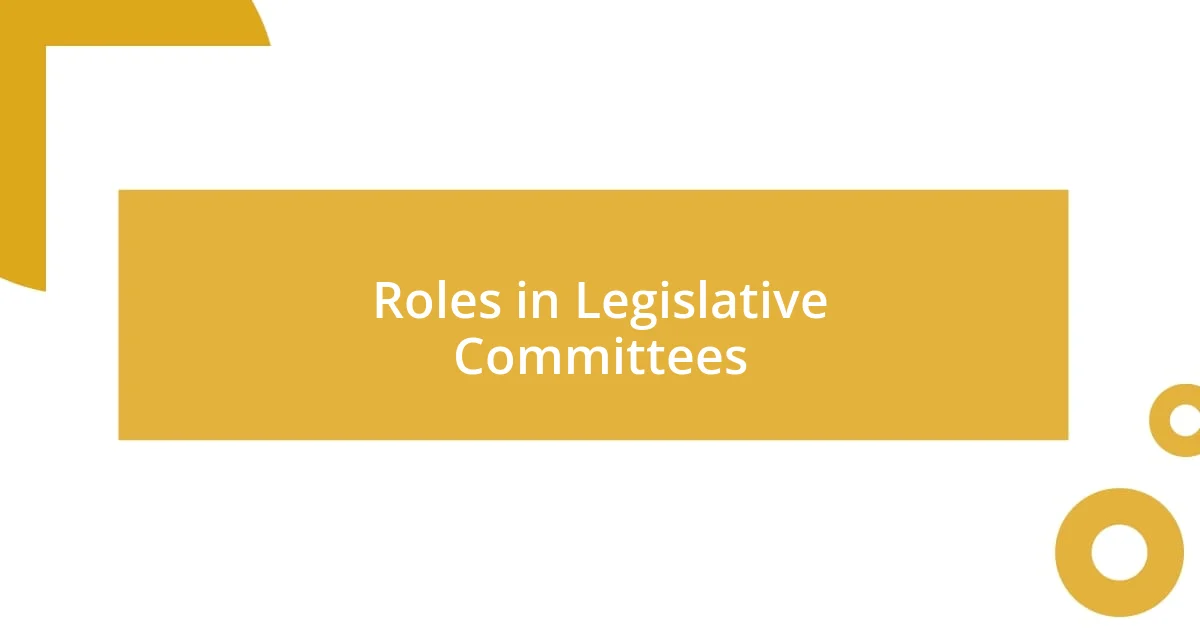
Roles in Legislative Committees
Legislative committees can have various roles, and each member plays a unique part in shaping the discussions. During my time in one committee, I noticed that the chairperson was pivotal in guiding conversations and maintaining focus. Their ability to steer debates helped ensure that every voice was heard—sometimes, the quieter members would bring the most profound insights if given the opportunity. Have you ever observed how a good facilitator can change the dynamics of a discussion? I certainly have.
Members of committees also serve as experts in their respective fields, which can make a real difference in the quality of legislation. I remember a committee session where an attorney specializing in environmental law provided expert testimony on a proposed bill concerning pollution control. Watching the legislators absorb that knowledge and ask pointed questions illustrated just how impactful that expertise can be. It made me realize that being well-informed isn’t just beneficial; it’s essential for making sound decisions.
Furthermore, I found that the role of rapporteur is often undervalued yet critical. This individual compiles all the insights and discussions into coherent reports, providing a roadmap for the legislative process ahead. There was a moment when I saw a rapporteur’s meticulously crafted report guide our committee’s direction on a contentious bill, enabling us to make informed recommendations. It genuinely amazed me how one person’s attention to detail could keep us on track when navigating complex issues. Don’t you think that having someone dedicated to clarity can significantly enhance the committee’s effectiveness?
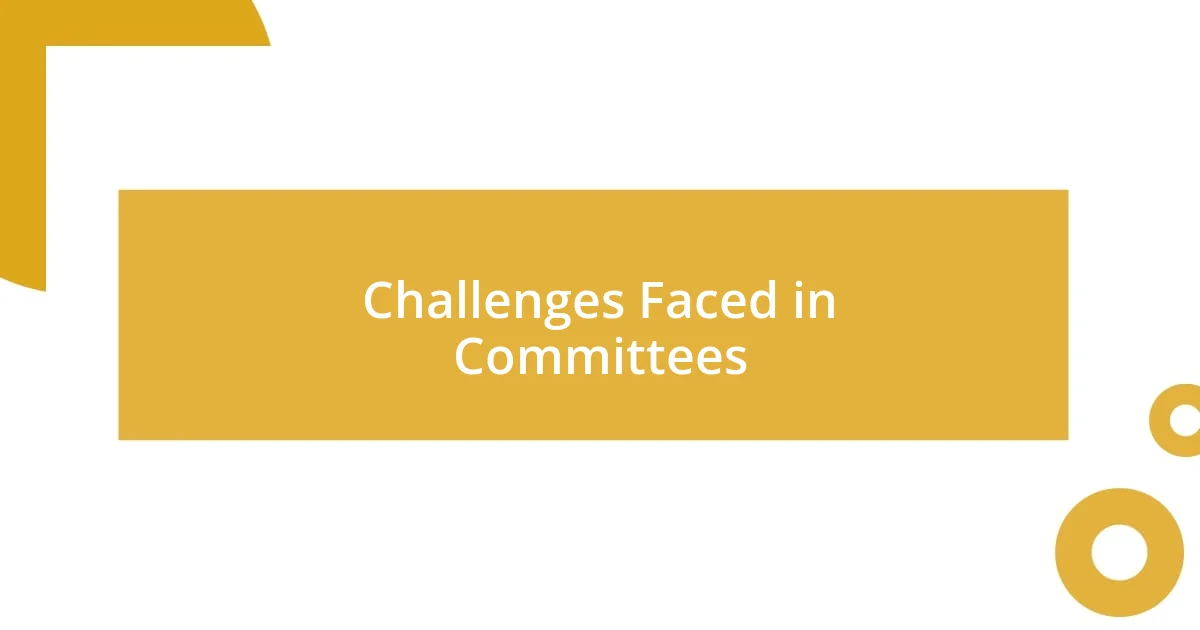
Challenges Faced in Committees
Navigating legislative committees can be challenging, especially when conflicting opinions emerge. I vividly recall a heated debate on housing policies where emotions ran high. It was disheartening to see members dismiss each other’s perspectives rather than seeking common ground. As I watched the back-and-forth unfold, I wondered: how can we progress if we’re unwilling to listen? This experience taught me that fostering a culture of constructive dialogue is crucial to overcoming barriers within committees.
Another challenge that stands out is the time commitment required for thorough preparation. I was once faced with a mountain of research documents before a crucial meeting on public safety. It felt overwhelming, and I questioned how I would make sense of it all without burning out. Yet, I found that diving deep into the materials not only prepared me for informed discussions but also ignited my passion for the issues at hand. It was a reminder that, despite the difficulties, dedication can lead to significant growth.
Lastly, I often grappled with the bureaucratic nature of legislative processes, which can stifle innovation. After presenting an idea for a new youth engagement initiative, my enthusiasm was met with rigid procedural guidelines. Why do we sometimes prioritize process over progress? This experience left me with mixed emotions; while I understood the need for structure, I also felt a strong urge to advocate for more flexibility. It reinforced my belief that balancing regulations with creativity can pave the way for meaningful change.
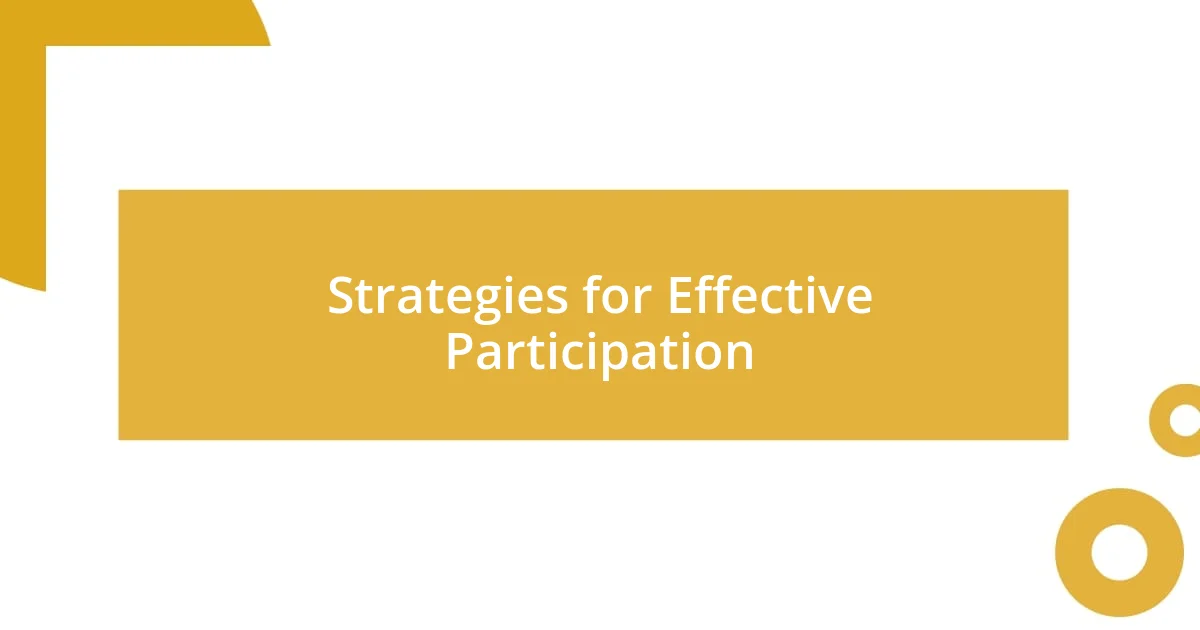
Strategies for Effective Participation
Effective participation in legislative committees requires intentional strategies tailored to navigate the complexities of the environment. One approach I found immensely helpful was preparing beforehand by digging deep into the subject matter. In one instance, I spent hours analyzing previous legislative sessions, which allowed me to anticipate questions and think critically about the issues at hand. Isn’t it fascinating how a solid foundation of knowledge can empower you during discussions? It truly makes a difference.
Moreover, actively building relationships with fellow committee members can amplify your contribution. I remember reaching out to a couple of members before a crucial vote, discussing our perspectives over coffee. This informal setting broke down barriers and created a sense of camaraderie. Do you recall a time when a simple connection helped nurture a collaborative spirit? For me, those moments of personal engagement often lead to more meaningful dialogue during meetings.
Lastly, embracing the art of persuasive communication is vital. I learned this lesson the hard way during a session where I failed to articulate my points clearly, leaving my arguments overlooked. However, after refining my presentation skills, I felt more confident in expressing my views. Watching my peers respond positively to my ideas was incredibly rewarding. Have you ever experienced the thrill of effectively conveying your thoughts and seeing them resonate with others? It reminded me that clarity in communication can bridge gaps between differing opinions, paving the way for constructive outcomes.
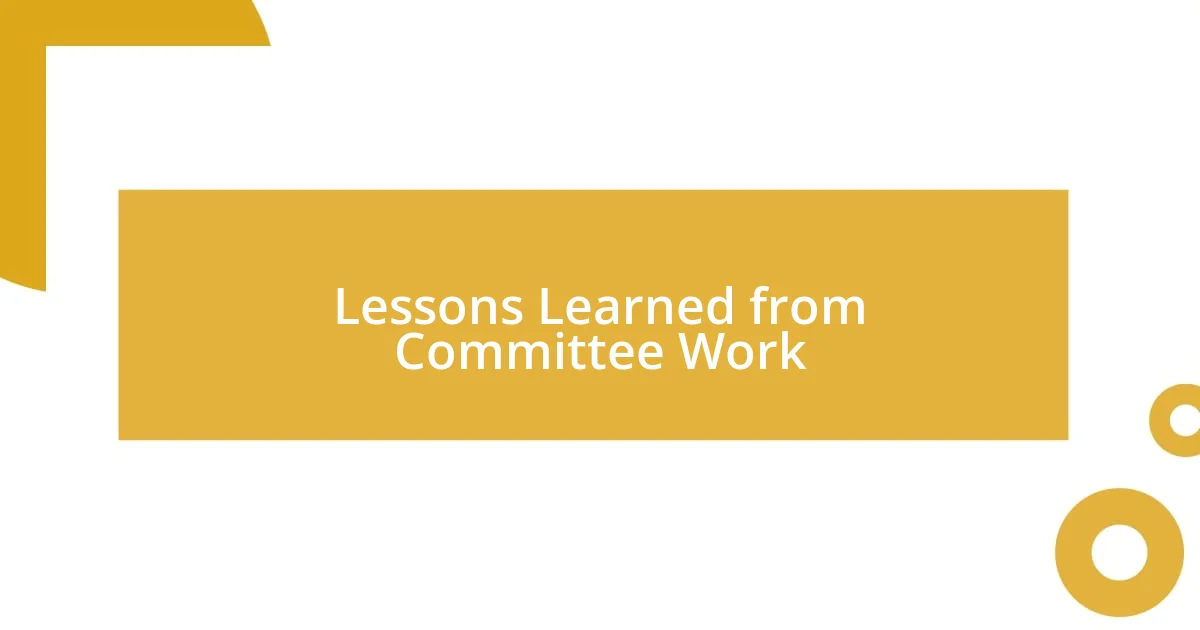
Lessons Learned from Committee Work
One of the most significant lessons I learned from my time in committees is the importance of patience. I vividly recall a discussion on environmental regulations that dragged on for weeks. As passionate as I felt about the need for immediate action, I quickly realized that change seldom happens overnight. Instead of becoming frustrated, I adopted a more measured approach, recognizing that legislative change requires careful deliberation. This taught me that sometimes, taking a step back and allowing the process to unfold can lead to more meaningful outcomes.
Collaboration is another lesson that stands out to me. During a particularly contentious meeting about healthcare reform, I noticed how quickly discussions became polarized. Yet, it was in the quieter moments, when members expressed their personal narratives related to the issue, that understanding began to blossom. Can you think of a time when storytelling shifted your perspective? Those shared experiences fostered empathy and ultimately helped us find common ground. It reinforced my belief that genuine collaboration is built on the foundation of shared human experiences.
Lastly, I learned the value of resilience in the face of setbacks. I once championed a proposal for increased community funding that I was sure would pass. However, it was met with fierce opposition and ultimately failed to secure the necessary votes. Initially, I felt disheartened and questioned my efforts. But after reflecting on the experience, I realized that every setback provides an opportunity for growth. I committed to staying engaged, refining my ideas, and returning with renewed vigor. Have you ever felt that urge to regroup after a disappointment? It’s that drive to keep pushing forward that often leads to unexpected breakthroughs.










